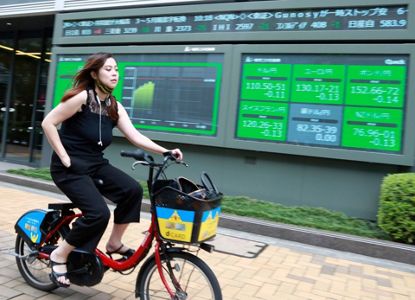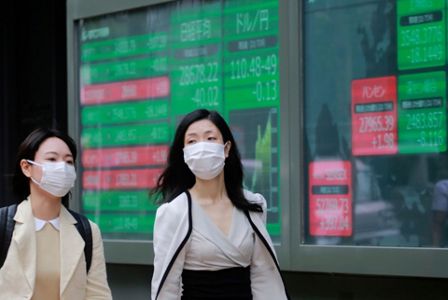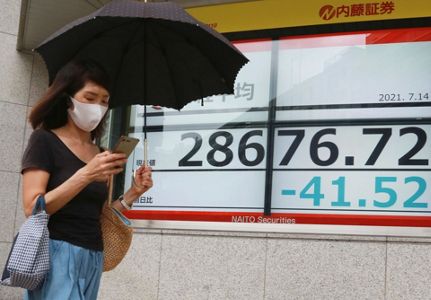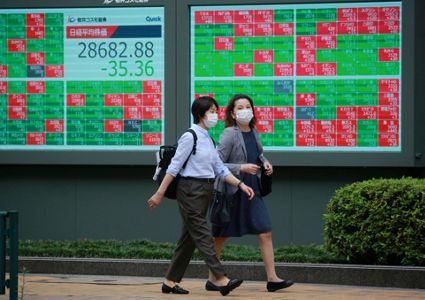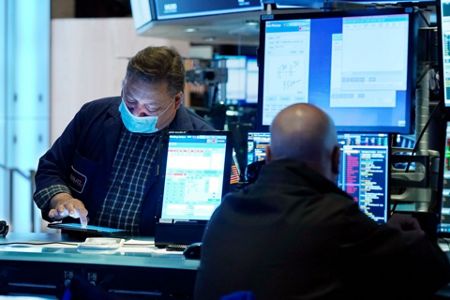TOKYO (AP) — Asian shares were mostly lower on Wednesday, tracking a decline on Wall Street as investors weighed the latest quarterly earnings reports from big U.S. companies and data pointing to rising inflation.
Japan's benchmark Nikkei 225 edged down 0.2% in early trading to 28,661.50. Australia's S&P/ASX 200 added 0.2% to 7,349.60. South Korea's Kospi slipped 0.3% to 3,261.48. Hong Kong's Hang Seng dropped 0.6% to 27,784.74, while the Shanghai Composite dipped nearly 0.9% to 3,535.83.
“This backdrop of higher for longer U.S. inflation and a faster hiking Fed and strengthening USD is not a good recipe for emerging Asia,” said Robert Carnell, regional head of research Asia-Pacific at ING, referring to the U.S. currency.
Surging coronavirus cases in Indonesia, Malaysia and Thailand are another concern, he said. South Korea also is seeing cases jump. It released data showing an improvement in the jobless rate, but the numbers were collected before pandemic restrictions were tightened.
Some parts of Japan are also seeing an uptick in COVID-19 infections, fanning fears about the tens of thousands of athletes, dignitaries and other people from some 200 nations entering the country for the Tokyo Olympics. Tokyo is reporting hundreds of new cases daily. Some experts say that could jump to thousands in coming weeks, as the “bubble” conditions for the Olympians have been compromised, with staff and athletes testing positive for the virus. The Games open on July 23.
On Wall Street, the S&P 500 fell 0.4%, with most of the companies in the benchmark index losing ground. Banks, industrial stocks and companies that rely on consumer spending accounted for a big share of the decline. Technology stocks bucked the trend, helping counter some of the broader slide. Small company stocks took some of the heaviest losses.
The pullback brought the major stock indexes slightly below the record highs they set a day earlier. Treasury yields rose.
Investors sized up mixed quarterly earnings reports from Goldman Sachs, JPMorgan Chase, PepsiCo and other big companies. They also got another snapshot of how inflation continues to show up in the economy as the a rapid spike in consumer demand and supply constraints translate into higher prices for consumer goods.
The latest report from the U.S. Labor Department showed yet another increase in consumer prices in June that surprised economists. Prices jumped by the most in 13 years, extending a run of higher inflation that has been raising concerns on Wall Street that the Fed might consider withdrawing its low-interest rate policies and scaling back its bond purchases earlier than expected.
Much of the increase in prices for goods, such as used cars, is mostly tied to a surge in demand and lack of supply. Prices for many items, like lumber and other raw materials, are easing or will ease as suppliers ramp up operations, said Jamie Cox, managing partner at Harris Financial Group.
The S&P 500 fell 15.42 points to 4,369.21. The Dow Jones Industrial Average dropped 0.3% to 34,888.79. The tech-heavy Nasdaq slid 0.4% to 14,677.65, while the Russell 2000 index of smaller companies lost 1.9%, to 2,238.86.
“You had the element of just incredible earnings reported for the most recent quarter, but in some of the commentary that came out there were some questions about, ’OK, what about cost pressures going forward?” said Alan McKnight, chief investment officer at Regions Asset Management. “Then you pair that with the inflation report today where we see another high print.”
Investors also are listening closely for clues about how companies have fared during the recovery and how they see the rest of the year unfolding.
Goldman Sachs fell 1.2% despite reporting the second-best quarterly profit in the investment bank's history. JPMorgan Chase dropped 1.5% after giving investors a mixed report with solid profits but lower revenue as interest rates fell over the last three months.
“The financials have had that real tailwind of rates going higher,” McKnight said. “We’ve already priced that in. Now it’s almost a ‘show me’ story. Can you actually prove that you can deliver earnings at a much higher clip once we get back to a more normalized environment?"
Conagra Brands slid 5.4% for the biggest drop in the S&P 500 after the owner of Chef Boyardee’s and other packaged food brands gave investors a weak financial forecast, citing inflation pressure. Fastenal, maker of industrial and construction fasteners, also said it expects more pressure from inflation in product and transportation costs. The stock fell 1.6%.
Bond yields slipped to 1.40% from 1.42% late Tuesday. Overall, yields have been trending lower after a sharp spike earlier in the year.
The calmer bond market is partly signaling more confidence that rising inflation will likely be temporary and tied mostly to the economic recovery.
Solid earnings did help some companies make gains. PepsiCo rose 2.3% after beating Wall Street's second-quarter profit and revenue forecasts.
Boeing fell 4.2% after announcing production cuts for its large 787 airliner because of a new structural flaw in some planes that have been built but not delivered to airline customers.
In energy trading, benchmark U.S. crude lost 18 cents to $75.07 a barrel in electronic trading on the New York Mercantile Exchange. It picked up $1.15 to $75.25 on Tuesday. Brent crude, the international standard, fell 12 cents to $76.37 a barrel.
In currency trading, the U.S. dollar fell to 110.53 Japanese yen from 110.61 yen. The euro cost $1.1779, inching up from $1.1774.
___
AP Business Writers Damian J. Troise and Alex Veiga contributed.
Copyright 2021 The Associated Press. All rights reserved. This material may not be published, broadcast, rewritten or redistributed without permission.



